Help Children Develop Social and Emotional Learning Skills With TeachKind Resources
Especially now, as we navigate these unprecedented times, children should be encouraged to develop their problem-solving skills, be actively aware of their own well-being, and flex their empathy muscles for others, including animals. These foundational skills can be cultivated by using TeachKind resources in the classroom, virtually, or at home.
Social and Emotional Learning
According to the Collaborative for Academic, Social, and Emotional Learning, the five core competencies of social and emotional learning (SEL) are self-awareness, self-management, social awareness, relationship skills, and responsible decision-making. Activities that focus on compassion for animals can help students strengthen these competencies and shape them into responsible, critical-thinking, empathetic young people. TeachKind is here to lend a helping hand by providing resources that not only engage students in various aspects of SEL but also help them become compassionate and confident members of society.
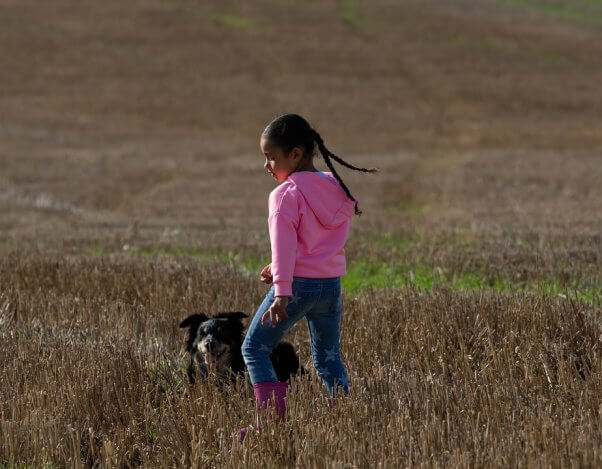
TeachKind and SEL Core Competencies
SELF-AWARENESS
The following lessons and activities teach students how to identify their emotions and how doing so can influence their behavior.
Elementary
Share the World: Practicing Empathy
Students are asked to look at examples of people showing empathy in various situations and relate that to their own experiences.
K-2
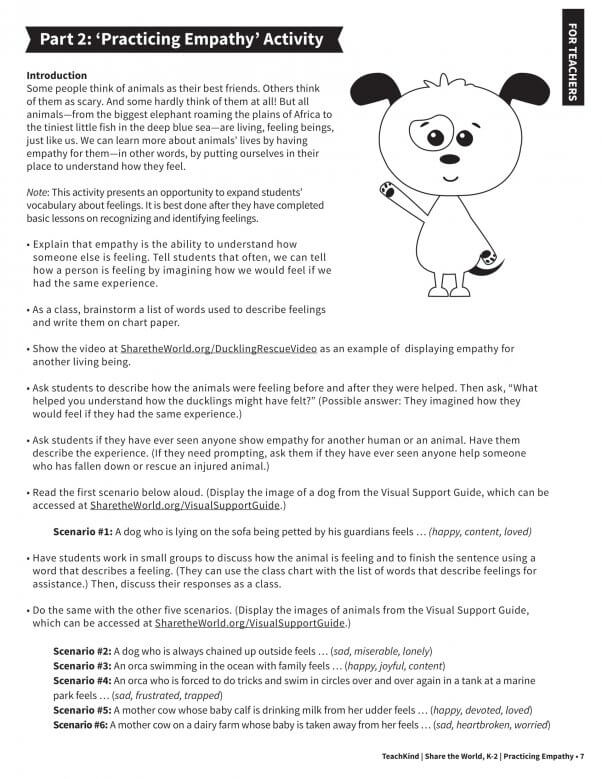
3-5
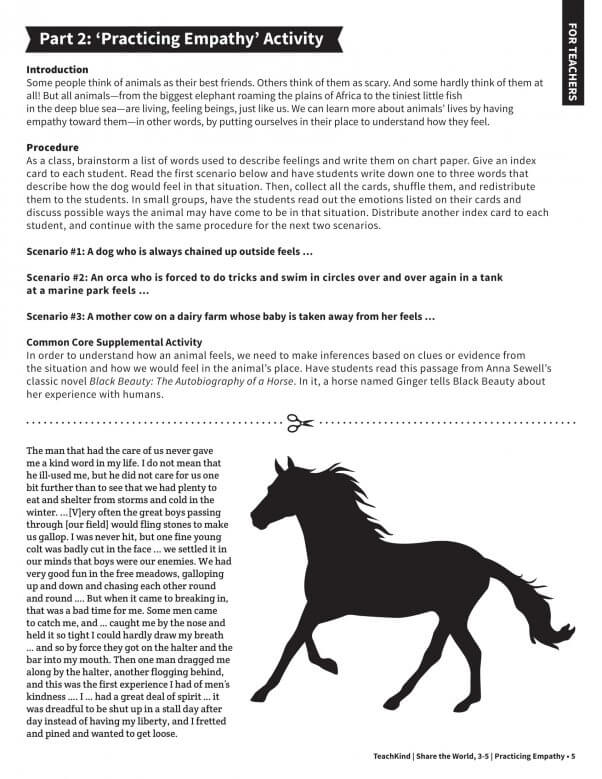
Middle and High
Cognitive Dissonance and How We Treat Animals
This activity can be used to teach about cognitive dissonance as a psychological experience, give examples of discordant beliefs and behavior in our society as a whole, and examine the dissonance that occurs between students’ opposing personal attitudes and actions.
SELF-MANAGEMENT
The following lessons and activities teach students the importance of regulating their own emotions and behavior in various situations.
Elementary
‘Hey, Little Ant: Little Guy Makes a Big Case’ Activities
Hey, Little Ant by Phillip and Hannah Hoose helps students see the world through the eyes of an ant. It offers a great opportunity to encourage them to be mindful of other living beings and consider the consequences of their actions. When kids learn to see things from the point of view of even the smallest animals, this can lead to more empathetic behavior toward their peers.
Hobbes Goes Home Emotions Dice Game
Hobbes Goes Home is a book full of expressive illustrations, excellent for helping students identify similar situations and feelings that they and others might share with Hobbes. Use the Emotions Dice Game to prompt discussions with your students about recognizing our own emotions and how doing so can help us have more control over them and our actions toward other humans and animals.
Share the World: Golden Rule and You
This comprehensive program helps children see that we can make choices to ensure that we treat others with compassion and respect at all times—and that we should follow the Golden Rule not only in our relationships with other humans but also in our relationships with animals.
K-2
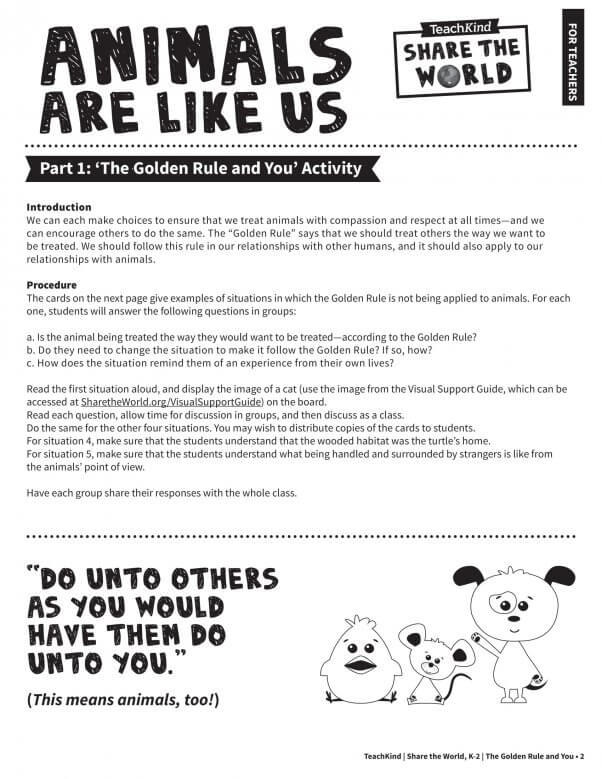
3-5
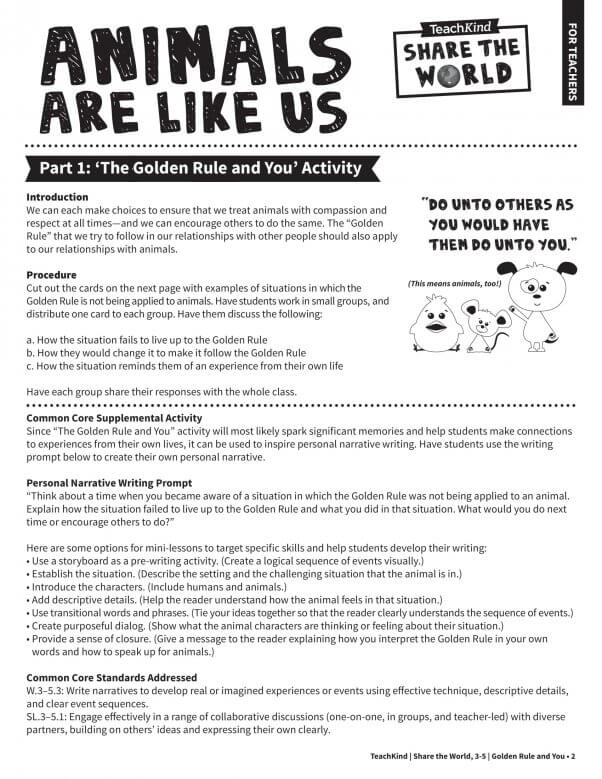
SOCIAL AWARENESS
The following lessons and activities teach students the importance of having empathy and respect for others.
Elementary
This pledge allows children to commit to putting the Golden Rule into action and inspires them to be respectful of all sensitive living beings as well as our planet.
Middle and High
It’s important for young people to recognize that humans have collective responsibility for the Earth and all its inhabitants—including animals. And behaving responsibly starts with becoming aware of the effects that our personal actions have on our global society.
Check out the example set by one of our kind A-list teachers, who showed his high school students how to rescue animals humanely and encouraged them to take action for even the smallest individuals. The students in this class went out of their way to save animals who found themselves lost or in distress:
https://www.youtube.com/watch?v=zCIrb64ByPc
RELATIONSHIP SKILLS
The following lessons and activities teach students the importance of working effectively with others in order to build relationships and accomplish a common goal.
Elementary
‘Like You, Only Different’ Personality Quiz and Nameplates Icebreaker Activity
This fun, informative personality quiz will help students get to know each other better while building empathy for animals.
This entertaining icebreaker will get your students to flex their empathy muscles and be more considerate of both animals and peers. It’s sure to become a favorite!
Middle and High
TeachKind Rescue Stories: Songwriter and Student Save Lamb From Slaughter
This rescue story is about a California boy in a 4-H program who—with the help of legendary songwriter and PETA supporter Diane Warren—prevented his beloved lamb, Cotton, from being slaughtered.
‘Change for Chained Dogs’ Fundraising Pack
You and your students can make a difference in the lives of “backyard dogs” by ordering TeachKind’s free, simple-to-use “Change for Chained Dogs” fundraising pack!

RESPONSIBLE DECISION-MAKING
The following lessons and activities teach students the importance of being conscious of others’ needs and feelings while searching for solutions to everyday problems.
Elementary
‘Meeting the Needs of Companion Animals’ Lesson
Start a conversation with your students about the importance of understanding the needs, likes, and dislikes of animals in order to care for them properly. Use the activities in this lesson to help students discover how to meet companion animals’ needs beyond the basic physical ones.
TeachKind Rescue Stories: Pickles the Rabbit
Pickles’ story can help you start a discussion with students about the importance of adopting—not buying—animal companions and caring for them properly.
Middle and High
TeachKind Rescue Stories: Teens Save a Suffering Squirrel
Use this story to inspire your students to help those in need—regardless of species.
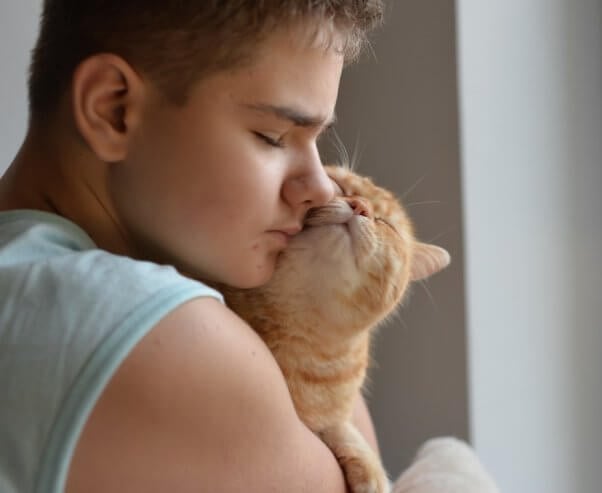
*****
We know kids love animals, so let’s use that natural tendency to help them develop these SEL competencies so that they can deal effectively and ethically with life’s challenges and contribute to their communities in a positive way for years to come.
Need more ideas for incorporating humane education into your curriculum? Sign up for TeachKind News here!
By submitting this form, you’re acknowledging that you have read and agree to our privacy policy and agree to receive e-mails from us.





